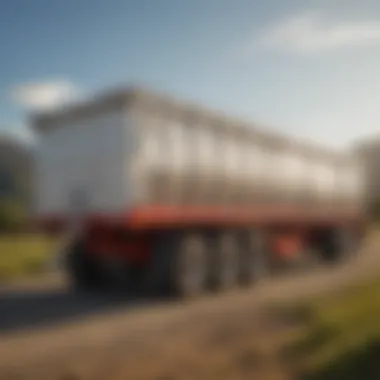Trail King Hopper Trailers: In-Depth Insights


Intro
Trail King Hopper Trailers serve as a crucial component in agricultural operations. Their design and functionality cater specifically to the transportation needs of various materials, particularly in the agricultural sector. Understanding the fundamental concepts surrounding these trailers will assist professionals in making informed decisions.
Key Concepts and Terminology
Basic Definitions
Hopper trailers are specialized vehicles used primarily to transport bulk materials. They are characterized by their open-top design, which allows for easy loading and unloading of materials such as grain, fertilizer, or feed. Trail King’s designs emphasize durability and efficiency, catering to a range of agricultural applications.
Historical Context
The development of hopper trailers can be traced back to the advancements in agriculture during the 20th century. As the demand for efficient transportation of bulk goods increased, manufacturers like Trail King emerged to meet agricultural needs. Over the years, these trailers have evolved in design and technology, improving their functionality and reliability.
Recent Innovations and Trends
Technological Advancements
Recent innovations in manufacturing and design have enhanced the performance of Trail King Hopper Trailers. Features like lightweight materials, aerodynamic shapes, and improved suspension systems contribute to better fuel efficiency and load capacity. These innovations allow for swift transportation while minimizing wear and tear on the vehicles themselves.
Sustainable Practices
In today's agricultural industry, sustainability is a priority. Trail King has responded by incorporating environmentally friendly materials and practices in their trailer production. For example, designing trailers that reduce carbon emissions during transportation aligns with the growing focus on sustainable agriculture. Using recycled materials in manufacturing also reflects a commitment to sustainability.
Practical Applications and Techniques
Step-by-step Guides
Selecting the right Trail King Hopper Trailer involves several steps:
- Assessing Needs: Determine the specific materials to be transported.
- Evaluating Capacity: Choose a trailer that meets the volume requirements.
- Consider Terrain: Ensure the trailer is suitable for the terrain of your operation.
- Budgeting: Compare prices along with features to find a cost-effective option.
Case Studies
Several agricultural businesses have successfully integrated Trail King Hopper Trailers into their operations. For instance, a grain farm in Iowa leveraged these trailers to enhance their harvest efficiency. By utilizing trailers optimized for grain transport, they reduced loading times and improved overall productivity. These real-world examples highlight the practical benefits and adaptability of Trail King Hopper Trailers in varying agricultural settings.
"Investing in a quality trailer is investing in your operation's future. It pays off in efficiency and reliability."
In summary, understanding Trail King Hopper Trailers—their design, application, and innovations—equips agricultural professionals with the necessary insight to enhance their operations. This knowledge is vital for optimizing productivity and sustainability in modern agriculture.
Foreword to Trail King Hopper Trailers
The significance of Trail King Hopper Trailers becomes clearer when one considers the increasing demands of the agricultural industry. Farmers require efficient transportation solutions to move bulk materials such as grains, seeds, and fertilizers. This is where the design and functionality of hopper trailers play a vital role. Trail King, as a prominent manufacturer, provides a range of hopper trailers tailored to meet these needs.
Understanding Hopper Trailers
Hopper trailers are specialized vehicles designed for carrying bulk materials. Their unique structure enables easy loading and unloading, making them ideal for agricultural and industrial applications. A notable feature is the hinged bottom, which allows for the contents to be easily discharged. This design reduces labor during loading and unloading while increasing efficiency.
Key characteristics of hopper trailers include:
- Durability: Built with robust materials to withstand harsh conditions.
- Capacity: Available in various sizes to accommodate different hauling needs.
- Flexibility: Suitable for transporting a range of materials, from agricultural inputs to construction aggregates.
Hopper trailers serve essential functions in agriculture. They help streamline operations, enabling farmers to transport products quickly and effectively.
The Role of Trail King in the Market
Trail King is a key player in the trailer manufacturing sector. Their commitment to quality and innovation sets them apart. Understanding their position within the market helps consumers recognize why their products are preferred by many in the agricultural sphere.
Trail King’s emphasis on engineering high-performance trailers meets the specific needs of its users. Their trailers are recognized for:
- Quality Construction: Heavy-duty frames and specialized components ensure long-lasting performance.
- Innovative Designs: Continuous improvements to increase payload capacity and ease of use.
- Customer Support: An established network to assist users with inquiries and maintenance, enhancing the overall ownership experience.


In summary, Trail King Hopper Trailers provide vital solutions for transporting bulk materials. Their advanced design and durability demonstrate the brand's significance in promoting efficient agricultural practices.
Design Features of Trail King Hopper Trailers
The design of Trail King Hopper Trailers plays a pivotal role in their overall performance and functionality. Every feature is crafted to meet the needs of farmers and agricultural operators, ensuring efficiency, durability, and ease of use. Understanding these design elements helps potential buyers make informed decisions when selecting the right trailer for their operational requirements.
Materials and Construction
Trail King Hopper Trailers are known for their robust construction, which is essential for handling heavy loads and various agricultural materials. The primary materials used in these trailers include high-strength steel and aluminum alloys. High-strength steel provides the necessary robustness to withstand impact and wear, while aluminum components contribute to weight reduction without compromising durability.
The welding and assembly processes are crucial in ensuring longevity. Attention to detail in construction minimizes weak points, reducing the likelihood of failure during use. Regular maintenance of the trailer’s structure can ensure its extended usability, making it a sound investment for farmers.
Capacity and Size Variations
When choosing a hopper trailer, capacity and size are essential considerations. Trail King offers various options that cater to specific agricultural transporting needs. From smaller models suitable for narrow pathways to larger trailers that can handle substantial loads, there is flexibility in size.
The capacity of these trailers typically ranges from 600 to 1,800 bushels. Understanding the specific capacity required can enhance efficiency in operations. It affects how many trips are needed for transportation, which in turn impacts fuel costs and time management.
Aerodynamics and Fuel Efficiency
Aerodynamics might not be the first consideration for many farmers, but it plays a vital role in reducing fuel consumption. Trail King incorporates design features that minimize air resistance. This design translates into improved fuel efficiency, allowing agricultural operators to save on operating costs over time.
For example, the trailer’s body shape and the overall structure are designed to aid airflow. It's important that the trailer not only meets payload requirements but also aligns with the operational demands for efficiency. A consideration of aerodynamics contributes to reducing exhaust emissions and promotes a more sustainable operation overall. In a time where sustainability is critical, fuel-efficient trailers represent a step toward responsible farming.
Types of Trail King Hopper Trailers
Understanding the various types of Trail King Hopper Trailers is essential for agricultural professionals. Each type serves a specific purpose and offers distinct features that can enhance operational efficiency. These trailers are designed to meet the diverse needs of farmers and businesses. By recognizing the differences among them, users can make informed choices, ultimately maximizing productivity and satisfaction.
Standard Hopper Trailers
Standard Hopper Trailers are among the most commonly used types. They are built to transport a range of materials, including grain, feed, and other bulk goods. The design is focused on maximizing payload while maintaining stability during transit. One significant feature of standard hopper trailers is their ability to unload quickly, usually through gravity discharge or a series of gates located at the bottom.
Farmers find these trailers beneficial for dry bulk materials. Their versatility makes them suitable for various agricultural applications. They come in various sizes, allowing users to select a model that aligns with their specific hauling needs. Whether transporting corn or soybeans, these trailers effectively accommodate different load types.
Live Bottom Trailers
Live Bottom Trailers incorporate a unique mechanism to facilitate unloading. Instead of relying on gravity, they utilize a conveyor system, allowing for controlled discharge of materials. This is particularly advantageous for transporting delicate crops that might be damaged by sudden drops. The ability to maintain a steady flow reduces waste and increases efficiency.
Farmers appreciate the precision that live bottom trailers offer. They can easily manage the unloading process, ensuring minimal loss and better handling of sensitive materials. These trailers are also optimized for diverse settings, from loading docks to field operations. Their design minimizes the risk of clogging, making them ideal for operations that require consistent flow.
Dump Trailers
Dump Trailers represent another flexible option within the hopper trailer category. They excel in moving a variety of materials, including gravel, soil, and other bulk products. The primary function of these trailers is their ability to tip and discharge loads rapidly. This feature is particularly useful for construction sites where time is crucial.
Farmers may find dump trailers advantageous for transporting materials to and from fields. Their inclination feature allows for easy unloading, which can save labor time. It is also worth noting that dump trailers can come in various configurations to suit different load capacities and operational requirements.
In summary, the choice among standard hopper trailers, live bottom trailers, and dump trailers will largely depend on specific operational demands. Each type presents unique advantages that can enhance efficiency and productivity in various agricultural settings.
Applications of Trail King Hopper Trailers
Trail King Hopper Trailers serve a critical role in various sectors, particularly in agriculture and construction. Understanding the applications of these trailers is essential for optimizing productivity and ensuring operational effectiveness. They not only facilitate transportation but also enhance workflow efficiency in demanding environments. Various aspects make these trailers integral to different industries.
Agricultural Transportation Needs
In agriculture, the demand for efficient and reliable transportation of bulk materials is paramount. Trail King Hopper Trailers excel in this area, primarily by enabling the smooth transfer of grains, fertilizer, and other essential goods. Their spacious designs accommodate large volumes, minimizing trips and saving time. Moreover, the trailers are structured to handle a range of materials. This versatility makes them effective for farmers dealing with varying products throughout the season.
When considering the transportation needs, efficiency and stability are vital. The trailers often come equipped with features like advanced suspension systems that ensure smooth transportation, even on rough terrain. They also help reduce wear and tear on both the product and the vehicle.
Construction and Industrial Use
Beyond agriculture, Trail King Hopper Trailers find significant utility in construction and industrial settings. They can transport heavy materials like sand, gravel, and asphalt, which are crucial for construction projects. The durability and robust build of these trailers make them fit for heavy-duty tasks.


In many construction projects, time constraints are frequent. Utilizing Trail King Hopper Trailers allows companies to streamline their supply chain. Faster transportation of materials leads to quicker project completion and project timelines become more manageable.
"Efficiency in material transportation directly correlates with the productivity of construction operations."
Moreover, their adaptability in fitting with various equipment types enhances their appeal. Being able to shift between agricultural and industrial applications provides flexibility that many businesses look for in hauling solutions.
Environmental and Sustainability Considerations
There is growing emphasis on sustainability in all aspects of business operations. Trail King Hopper Trailers contribute positively in this regard. By utilizing these trailers, operators can reduce their carbon footprint. For instance, using fewer trips for transportation means lower emissions and less fuel consumption. Additionally, many models prioritize aerodynamics, which enhances fuel efficiency.
The materials used in the construction of these trailers also matter. Manufacturers are increasingly looking towards environmentally friendly practices in trailer production. This not only includes lightweight materials but also responsibly sourced components that minimize impact on the ecosystem.
Furthermore, some companies are implementing technology that monitors and optimizes trailer loads, contributing to further reducing environmental impact while maximizing efficiency.
Benefits of Using Trail King Hopper Trailers
Trail King Hopper Trailers offer numerous advantages that greatly enhance productivity in agricultural operations. Understanding these benefits helps farmers and industry professionals make informed decisions about their equipment. With efficient loading and unloading capabilities, these trailers stand out in the market. Below, we delve into the primary benefits of using Trail King Hopper Trailers.
Enhanced Efficiency
One of the key benefits of Trail King Hopper Trailers is their enhanced efficiency in the transportation of bulk materials. These trailers are designed to provide quicker and smoother loading and unloading processes. The low-profile design allows for easier access, thereby reducing the time spent per load. Efficient hydraulic systems also play a significant role in optimizing the operation. By minimizing loading and unloading times, farmers can focus on other critical tasks, thereby improving overall productivity. In agricultural settings, this means faster turnaround times during harvest or feeding cycles.
Cost-Effectiveness
Investing in Trail King Hopper Trailers can lead to notable cost savings. This is attributed to the durable materials used in construction, which reduce maintenance costs over the trailer’s lifespan. A well-maintained hopper trailer also offers longevity, ensuring users get value for their investment. Furthermore, the efficiency gained from using these trailers translates to lower operational costs, especially in fuel consumption. For many farmers, minimizing expenses while maximizing productivity has a direct positive impact on their bottom line.
Versatility in Operations
Trail King Hopper Trailers are not limited to one type of load or operation. Their versatility allows them to transport various materials, including grain, sand, or other bulk goods. This adaptability is crucial for farms that manage multiple types of operations. Additionally, different configurations, such as live bottom or standard hopper types, can cater to specific agricultural needs. This flexibility means that with a single trailer type, farmers can effectively address diverse transportation needs without requiring multiple specialized trailers.
"Investing in the right trailer can transform the efficiency of agricultural operations and improve overall productivity."
In summary, the benefits of Trail King Hopper Trailers contribute significantly to operational efficiency, cost savings, and versatility. These elements are crucial for farmers looking to streamline their activities and improve their returns. By understanding these advantages, agricultural stakeholders can make better choices and enhance productivity in their operations.
Maintenance and Care for Trail King Hopper Trailers
Maintaining and caring for Trail King hopper trailers is crucial for ensuring their longevity and efficiency in operation. Regular maintenance not only extends the life of the trailer but also enhances safety and performance. The complex nature of these trailers, designed for heavy loads and various terrains, necessitates a systematic approach to upkeep. Neglecting maintenance can lead to costly repairs, reduced productivity, and safety hazards.
Regular Inspection Protocols
Regular inspection protocols are an essential component of trailer maintenance. Scheduling consistent checks helps identify potential issues before they escalate. Inspections should include a thorough examination of:
- Brakes: Ensure the braking system operates seamlessly. Check the brake pads and fluid levels.
- Tires: Gauge the tire pressure and inspect for any signs of wear or damage. Properly inflated tires contribute to better fuel efficiency.
- Frame and Suspension: Look for cracks or signs of fatigue in the frame and suspension components. A sound frame is vital for carrying heavy loads.
- Hopper Mechanisms: Test the hopper mechanisms to confirm they open and close properly. Malfunctions here can hinder unloading efficiency.
Creating a checklist based on these parameters can help maintain consistency in inspections.
Common Repairs and Troubleshooting
Despite preventive measures, repairs may become necessary over time. Understanding common issues and troubleshooting can save time and money. Key areas to monitor include:
- Electrical System: Problems with the wiring can lead to lights or signaling failures. Inspect fuses and connections.
- Trailer Body: Dents and corrosion occur naturally with heavy use. Addressing these quickly can prevent further damage and ensure the structural integrity of the trailer.
- Hopper Seal Leaks: When sealed properly, hoppers maintain the quality of unloaded goods. Check for leaks regularly, fixing any issues to keep operations running smoothly.
Engaging a professional mechanic for complex issues may be prudent. However, basic troubles can often be handled with the right tools and guidance.
Seasonal Maintenance Tips
The change of seasons can affect trailer performance. Seasonal maintenance is important to adapt to weather conditions. Here are some tips for each season:
- Spring: After winter, conduct a thorough inspection to check for any winter damage. Clean the trailer from road salt and grime.
- Summer: Ensure that the cooling systems are functioning correctly. Heat can stress equipment and lead to overheating.
- Autumn: Prepare the trailer for colder months by checking insulation and sealing any gaps to prevent fluid loss.
- Winter: Keep the trailer indoors when possible to protect from snow and ice. Cover the trailer to shield from harsh weather.
By adhering to these seasonal tips and maintaining a routine inspection schedule, operators can significantly enhance the performance and lifespan of Trail King hopper trailers.


Remember: Consistent care will yield fewer surprises and lower overall operating costs.
Purchasing Considerations
When it comes to investing in a Trail King Hopper Trailer, understanding the purchasing considerations is essential for making a well-informed decision. This segment highlights key factors that influence the buying process. Buyers need to evaluate their specific needs, whether they expect to use a trailer for agriculture or other purposes. Knowing the differing capacities, designs, and features can guide the choice in the right direction.
New vs Used Trailers
The choice between new and used trailers is one of the primary decisions buyers face.
- New Trailers: Buying a new Trail King Hopper Trailer often comes with the assurance that the trailer includes the latest features and technology. Innovations may enhance efficiency and reliability. Furthermore, new trailers typically come with warranties, providing peace of mind.
- Used Trailers: On the other hand, opting for used trailers can significantly reduce upfront costs. However, buyers should conduct thorough inspections to assess condition and functionality. Potential maintenance costs and the remaining lifespan of used trailers should be distinct factors in this decision.
Ultimately, weighing the benefits of new versus used is crucial and should align with individual operational needs and budget.
Financing Options and Budgeting
Budgeting and financing are critical elements when considering a purchase.
- Budget Establishment: Buyers must first outline their financial capacity. This includes not just the initial cost of the trailer but also potential maintenance costs, insurance, and possible modifications.
- Financing Solutions: Many dealers offer financing solutions. Low-interest loans or lease options can ease cash flow management. Assessing repayment terms and interest rates is vital carefully to avoid unexpected financial burdens.
Opting for financing solutions gives buyers greater flexibility. However, it requires careful planning to ensure obligations are manageable in the long run.
Selecting a Reliable Dealer
When choosing a dealer, reliability and reputation should be a priority.
- Research and Reviews: Successful purchases often depend on the quality of the relationship with the dealer. Researching online reviews and seeking testimonials from previous customers can provide insights into the dealers' credibility.
- Support and Service: An ideal dealer doesn’t just sell a trailer; they should offer ongoing support. Knowledgeable staff can assist with product-related queries and post-purchase services. Look for dealers who understand the nuances of Trail King products.
Innovations in Hopper Trailer Technology
Innovations in hopper trailer technology play a vital role in enhancing the efficiency and effectiveness of agricultural practices. These advancements not only improve operation capacity but also influence the sustainability of farming methods. It is essential to consider the impact of these innovations when selecting a trailer that best fits the contemporary demands of agricultural operations.
Technological Advancements
The recent technological advancements in hopper trailers have led to several improvements. Enhanced materials and construction methods contribute to increased durability and lower maintenance costs. For example, trailers now often utilize lightweight but strong materials, improving fuel efficiency due to decreased overall weight. Every ounce matters in agricultural transport, and lowering the weight of trailers allows for larger payloads without exceeding weight limits.
Additionally, modern trailers incorporate better suspension systems. These systems provide smoother rides, reducing stress on both the trailer and the equipment towing it. This also leads to less wear and tear on roads, an important consideration for many farmers.
Automation features are increasingly becoming a standard. Features such as automated discharge systems reduce the amount of manual labor and increase the speed at which materials can be transported. The integration of electronic monitoring systems enables users to track loads in real-time, providing valuable data for optimizing transportation routes and schedules.
Integration with Smart Farming Solutions
The integration of hopper trailers with smart farming solutions represents a significant shift towards data-driven agriculture. By utilizing technologies such as GPS and IoT, farmers can enhance their operational efficiency dramatically. Smart sensors in trailers can monitor load weights, temperatures, and even moisture levels, providing critical metrics for optimizing delivery schedules and maintaining product quality.
Furthermore, when combined with farm management software, this data can guide farmers in decision-making processes. This means that a strategy is not just based on experience but also on real-time, factual information. Thus, farmers can adjust operations promptly, leading to better yields and less waste.
Farmers are encouraged to explore these smart integrations. They have the potential to not only make the physical aspect of farming easier and more efficient but also contribute to higher overall productivity. This approach transcends traditional farming practices and encourages a progressive mindset within the industry.
"Innovations in trailer technology will define the future of agricultural efficiency."
In summary, innovations in hopper trailer technology and their integration with smart solutions present an opportunity for the agricultural sector to adapt and thrive. Both the technical advancements and the shift towards smart farming reflect a growing desire for improved productivity, sustainability, and efficiency.This is particularly important as agriculture continues to face challenges from population growth and environmental concerns.
The End
The conclusion serves an important role in summarizing the main points of this article about Trail King Hopper Trailers. By revisiting the core aspects discussed, readers can clarify their understanding of the topic and see the broader implications for agricultural practices. These trailers are designed with features that support diverse applications, which can greatly influence farming efficiency.
Recap of Key Points
In this article, we covered several vital elements related to Trail King Hopper Trailers. Here’s a brief recap of the key points:
- Design Features: The materials used in construction, different capacities, and aerodynamics shown enhance their functionality.
- Types Available: Various types of hopper trailers like standard, live bottom, and dump trailers address different transportation needs in agriculture and construction.
- Applications: These trailers are pivotal in agricultural transportation, construction, and even in environmentally conscious operations.
- Benefits: There is emphasis on enhanced efficiency, cost-effectiveness, and operational versatility that these trailers offer.
- Maintenance: Proper care and routine checks can prolong the trailer's lifespan and ensure reliability.
- Innovations: Emerging technologies integrated with smart farming solutions promise to elevate the operational capabilities of these trailers.
This summary aids agricultural professionals in weighing their options when considering a Trail King Hopper Trailer for their needs.
Future Trends in Trailer Technology
The landscape of trailer technology is shifting. With advancements in automation and connectivity, the future of Trail King Hopper Trailers is likely to include enhanced features.
- Autonomous Capabilities: There is growing interest in self-driving technology within the agricultural sector, which could be integrated into hopper trailers to improve efficiency.
- Data Integration: Smart farming solutions may incorporate data analytics to optimize payload, route planning, and fuel consumption, making operations more efficient.
- Sustainability Focus: Innovations aimed at reducing environmental impact will further drive the development of trailer technologies, aligning with broader sustainability goals in agriculture.















